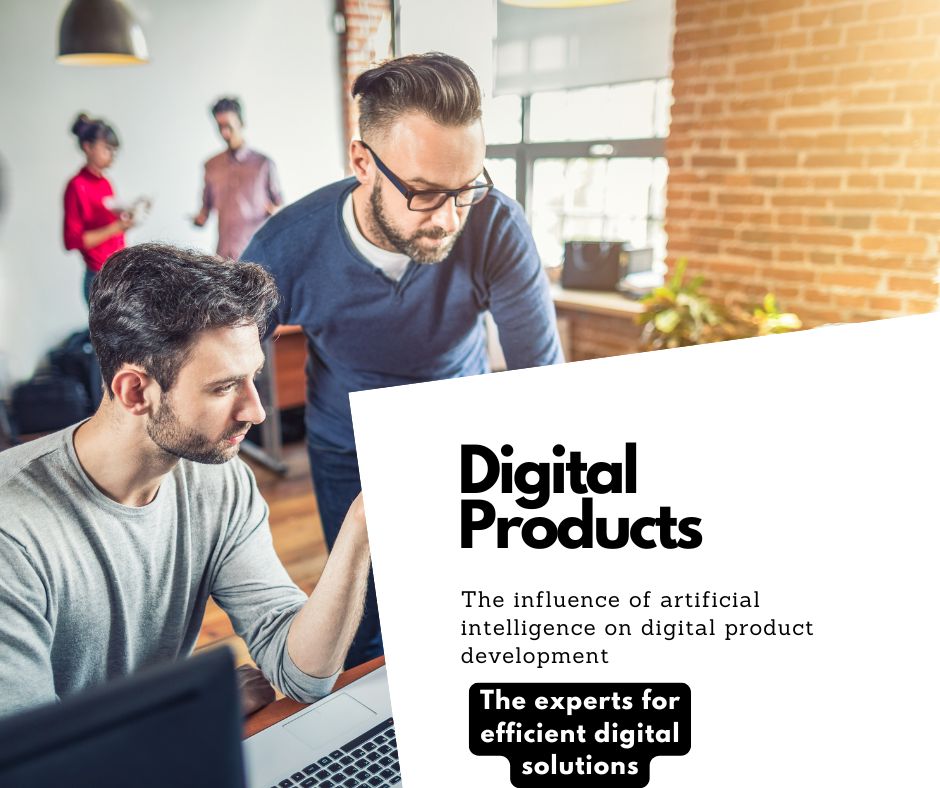The influence of artificial intelligence on digital product development

Digital product development has evolved rapidly in recent years. Artificial intelligence (AI) is a key factor influencing this development. AI technologies are not only transforming the way products are developed, but also how they are designed, tested and brought to market. In this article, we take a look at the different ways AI is revolutionizing digital product development and the benefits it offers companies.
Automation of processes
A key impact of AI on digital product development is the automation of routine tasks. By using AI-driven tools, companies can automate time-consuming tasks such as:
- Data analysis: AI can quickly analyze large amounts of data and provide valuable insights that are crucial for product development. This enables data-driven decision-making that improves the quality of the end product.
- Test automation: AI-supported test tools can detect and rectify errors in real time during software development. This reduces the time required for manual testing and improves software quality.


Personalization of products
AI enables companies to tailor products more closely to the needs and preferences of users. By analysing user data and behavioural patterns, companies can offer personalized products or services. Examples of this are
Improving the user experience (UX)
Another area where AI is having a big impact is in user experience design. AI-powered tools enable designers to make better UX decisions by:


Fast iteration and feedback
AI enables teams to respond more quickly to user feedback and improve products iteratively. With AI analysis tools, companies can:
Efficient resource planning
Introducing AI into the development process can also optimize resource planning. AI-supported project management tools can:


Case study 1: Automation in software development
Background:
A mid-sized software company was struggling to maintain the quality of its software products as manual testing took a long time and often led to delays in time-to-market. Repeated testing took a lot of time, which impacted the efficiency of the entire development team.
Solution:
After consulting with us, the company decided to introduce AI-supported test automation tools. These tools made it possible to carry out extensive tests automatically, allowing errors to be detected and rectified in real time. Training was also organized for the team to ensure that all employees could use the new tools efficiently.
Result:
After implementing the AI solutions, the company was able to reduce testing times by 70%. This led to faster delivery of updates and a significant increase in customer satisfaction. The efficiency of the development team was significantly improved and the company was able to bring new features to market faster.
Case study 2: Personalization in e-commerce
Background:
A leading online retailer was struggling to optimally address its customers. Despite a wide range of products and attractive offers, the conversion rate was falling short of expectations. The company needed a solution to encourage customers’ purchasing decisions and improve the shopping experience.
Solution:
The online retailer implemented an AI-supported recommendation system that analyzed users’ purchasing behavior and browsing habits. The system generated personalized product recommendations for each customer based on their individual preferences and previous purchases. Targeted marketing campaigns were also launched to highlight these recommendations.
Result:
Within six months of implementation, the conversion rate increased by 25%, while the average order value increased by 15%. Customers appreciated the personalized experience, which led to higher customer loyalty. The company was thus able to significantly increase its brand presence in the digital space and increase its sales.


Artificial intelligence is not just a tool, but a catalyst for innovation in digital product development. By using AI technologies, we enable our customers to respond faster and more efficiently to the needs of their users. Our goal is to help companies take full advantage of AI to develop customized solutions that can change the market.
Till Neitzke
Conclusion: The influence of artificial intelligence on digital product development
The impact of artificial intelligence on digital product development is enormous and is changing the way companies design, test and bring products to market. Through automation, personalization and improved user experiences, companies can not only increase their efficiency, but also increase customer satisfaction.
It is crucial that companies utilize the potential of AI and integrate it into their product development strategies. In this way, they can not only remain competitive, but also develop innovative products that meet the needs of users. The future of digital product development will undoubtedly be shaped by advances in artificial intelligence.

Successful together in the digital transformation –
Your introductory meeting with DMG
In our introductory meeting we will discuss
- what your current challenges are in digital projects
- how other companies have done it and how you can use this to your advantage.
- what needs to be done now and whether we are the right people for the job.
[ameliastepbooking]
